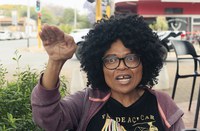Lebogang Ramafoko bids Soul City goodbye
Her journey, which began just after the new democracy, offered her the opportunity to harness her activism voice and make substantial changes, including the chance of turning the once sinking organisation into a sustainable one.
Reflecting, she still remembers vividly her first day as a 24-year-old arriving at 7th Avenue in Houghton, Joburg, having had taken a train from her then home in Krugersdorp and finding it very difficult to navigate this unfamiliar, intimidating suburb.
She walked into that organisation, blue-eyed and all, carrying many scars, and confronted with many opportunities. And that began the roller-coaster passion ride.
“The history of Soul City is very similar to the history of our democracy. Twenty-four years at the organisation, for me, was an opportunity to see what this freedom project for this country really was, at least from a health equity point of view.
“I have witnessed, through Soul City, what inequality really means. Walking into communities and seeing the repercussions of people having nothing and no one, seeing communities try to change and transform, but how politicians are not being held accountable for failing them. But I have also seen exhilarating moments with the organisation, when I go into communities and see young people who have risen to the occasion to do amazing things from as young as 10 and 14 years old.
"I have read reports on how those who form part of the Soul Buddies Club are more likely to finish school, take up leadership positions and be HIV-free.
“I have seen funding go and us having to close down programmes that work and have also witnessed small victories in the advocacy work that we stand for,” she said.
After all the work and passion, investments and triumphs, Ramafoko believes it is time for her to attempt new challenges.
Describing the years spent at the organisation, she uses the word “blessed”, saying she will never really leave Soul City because her allegiance is to the mission of the organisation, which is beyond the chief executive position.
“Soul City, as an institution, is heralded globally as a pioneer first, in the field of social and behavioural change communication, and also in its new vision as an intersectional feminist social justice organisation.
“For me, social justice is the core of what I believe I was born to do. It is about making sure that our gender, our sexual orientation, the colour of our skin - whether we are born in Houghton or in the townships does not limit who we can become.
“And as a black South African woman, who graduated on the eve of democracy, being told I talked too much, that I must either do teaching or nursing because that is all I could be as a woman or rather be trained to be a good and proper wife to somebody; these are the very issues that Soul City deals with and are issues I personally want to leave a legacy on, for all brown girls in Africa and beyond. That says it’s okay to question, that you need to talk too much and need to defy the rules that limit who you can be,” she said.
A position such as hers came with challenges from as basic as human management to piercing thorns in the sides of many NGOs - of funding, which is probably one reason that has fatigued her into resigning, she said.
But her time also taught her about what true leadership is, not a position but service to others.
“And the biggest thing I’ve learned in these nine years, is that; don’t be a leader if you don’t want to serve. But what we have seen in government and other places is that people are in service of themselves, and we’ve learned the worst from a apartheid and colonisation, like leaders are people you curtsy when, in fact, leaders are people who are selfless and they work for that greater good of those who follow them,” she said.
She will soon move to Cape Town, to work for Tekano Atlantic Fellows - a fellowship that affords leaders opportunities to deal with health equity in South Africa, which feels like a continuation of where she started with Soul City.
“My wish for NGOs in South Africa, and Soul City specifically, is; continue to be brave in your fight for equity in South Africa. The answers are not going to lie in government but civil society. They are already providing the answers,” she said.

